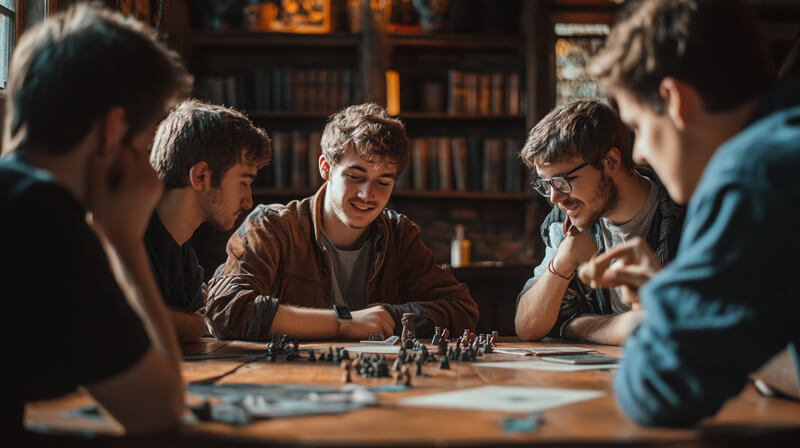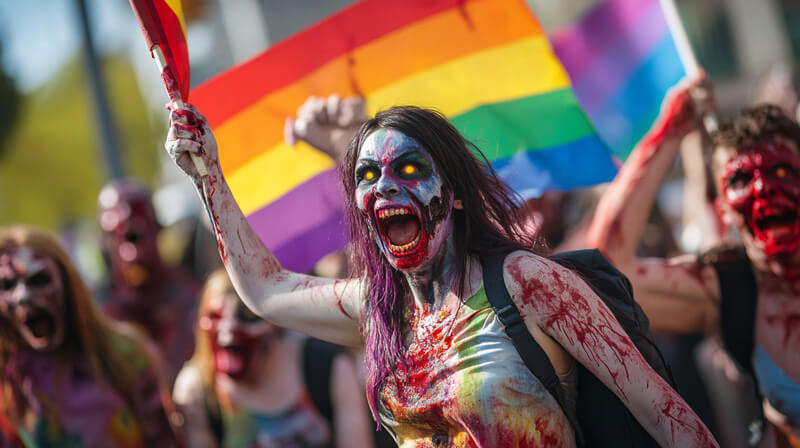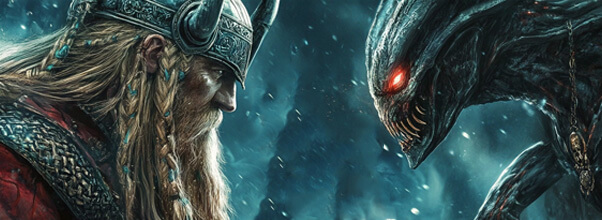For the past 30 years, the notion of representation has been incrementally injected into the cultural bloodstream. Even though nobody ever voted for representation ideology, it has crept into all walks of life, including business, government, and entertainment. While diversity is simply an ideology, representation is far more consequential because it is prescriptive.
At its heart, representation is an affront to the time-tested idea of merit. Characters are selected not for their suitability and cohesion with the story and setting, but for their physical and ideological characteristics.
Representation is also an affront to the cultural uniqueness of every nation. Every nation has an inherent right to create, nurture, and gatekeep its culture. Long-venerated cultures in Europe could easily be wiped away due to proportional representation from newly arrived African and Middle Eastern immigrants, who may overwhelm indigenous Europeans. French culture and Italian culture—just to name a few—are on the path to being transformed into a global multicultural amalgamation.
What is Representation?
To critique representation in the context of culture, we need to define it. Since the concept is so new, there are no real hard-and-fast definitions. Therefore, we turn to woke ChatGPT:
Representation in modern entertainment culture refers to the inclusion and portrayal of diverse identities, experiences, and perspectives in media, encompassing race, gender, sexuality, religion, ability, and cultural backgrounds. It aims to reflect the variety of human experiences in society, providing audiences with characters and narratives that resonate with their realities. Representation also seeks to challenge stereotypes and broaden understanding by showcasing underrepresented or historically marginalized groups in nuanced and authentic ways, influencing how viewers perceive themselves and others.
This definition reveals an extensive menu of social demands that activist groups are making behind the scenes in the entertainment industry. This is not a grassroots, bottom-up movement; rather, it is a top-down philosophy created in academia. It is an identity politics shakedown racket that directly opposes the idea of artistic freedom, where creatives are free to create without interference from tyrants, governments, cancel mobs, and activists.
Why Representation is Wholly Incompatible with Role-Playing Games
For the role-playing game (RPG) genre, the doctrine of representation poses a greater threat, as it seeks to intrude on the authenticity and sanctity of fantasy worlds, non-fantasy worlds, and even historically themed worlds that many of us escape to in our leisure time.

What is a role? According to Webster’s Dictionary it is the following:
a part played by an actor or singer
What is role-playing in the context of board and video games? Here’s ChatGPT’s take:
Role-playing in RPGs for board games and video games involves players assuming the roles of characters within a fictional setting, making decisions that influence the narrative and gameplay. It emphasizes character development, storytelling, and interaction with the game world, often blending strategic choices with imaginative immersion.
People who role-play in these worlds are obligated to stay true to their character’s personality, backstory, and motivations. This maintains immersion and enhances the shared storytelling experience. They should also respect the rules of the game and the contributions of other players, fostering collaboration and ensuring an engaging environment for everyone.
The Benefits of Role-Playing
Role-playing offers a unique blend of escapism, creativity, and social interaction. By stepping into the shoes of another character, individuals can explore different facets of their personality or entirely new identities, providing a safe space to experience adventures, solve problems, or live through scenarios outside their daily lives.

Role-playing also fosters a sense of community and collaboration. Players work together to craft stories or overcome shared challenges, enhancing social bonds and offering a form of play that is both engaging and intellectually stimulating. This immersion into alternative realities allows for personal growth, stress relief, and the sheer joy of imaginative exploration.
All these benefits will be eroded if we allow representation ideology to dominate the RPG genre.
GLAAD: The Root of the Problem
For the past decade, bad actors have been assaulting the RPG genre. Various virtue-signaling cultural Marxists have used diversity and representation as justifications to dictate the content of role-playing video games and board games like Dungeons & Dragons.
One of the primary activist groups responsible is GLAAD. This organization exists to normalize the behavior of non-heterosexuals, as outlined in the sinister book After the Ball: How America Will Conquer Its Fear and Hatred of Gays in the 90s by Marshall Kirk and Hunter Madsen. This book is a masterpiece in manipulating public opinion, comparable to the work of master propagandist Edward Bernays.

GLAAD demands that every form of art include positive portrayals of LGBTQ people. However, when it comes to “alphabet villains,” GLAAD opposes such portrayals. In this respect, they are akin to the hypocrites of the ADL, who demand their constituents always be portrayed positively.
GLAAD even pressured Netflix to remove the “LGBTQ” designation from the recent TV series Monster: The Jeffrey Dahmer Story, about the infamous homosexual serial killer.
Conclusion
It is not the responsibility of role-playing games to validate the identities, delusions, fetishes, or mental illnesses of players. Video game studios are also under no obligation to enact the dictates of governments, academics, or activists. Video games and board games exist solely to provide escapist participatory entertainment to people who are willing to pay for them.
In the final analysis, role-playing is about playing a role. It is not about being yourself or playing yourself as people are doing that already every day. Failure to role-play in a manner consistent with the setting of the game world degrades the immersion of others trying to role-play in good faith. A player’s real persona is inconsequential and subservient to the good of the community and the authenticity of the gaming world.
The current usurpation of role-playing by interlopers could have been avoided. Unfortunately, weak males failed to gatekeep role-playing video games and board games. Under their watch, the cancer of representation has infected these industries and laid waste to them.
The intrusion of representation ideology undermines the essence of role-playing. If this pernicious concept is allowed to fester, we risk losing one of the most unique and vibrant forms of participatory entertainment ever created.
–Wolfshead






It became worse over the last decade. Latest culmination was apparently in a Netflix show I didn’t watch, My Lady Jane, where the King of England is black, gay and disabled.
How the Assassin’s Creed games suddenly had to offer a female option, how suddenly in the Viking age 50% of Viking warrior were women… continue to science-fiction and fantasy novels, where suddenly authors had to add at least a gay character if not a whole gazillion of characters ticking off the DEI checkboxes.
Kingdom Come: Deliverance II is one of the latest culprits. There is not much representation in the game, a gay romance option and a black muslim from Mali lecturing how advanced and lovely towards women Islam is.
I don’t want to fully blame Warhorse studios for this unnecessary bull, they were acquired by Plaion, formerly Koch Media, who were in turn acquired by… the Swedish Embracer Group. They are quite woke and kill studios and game development regularly. Funnily, Saudi-Arabia owns stake in Embracer Group.
Assassin’s Creed: San Francisco got delayed again. The black main char is killing Asian people. Oh wait, sorry. It’s Assassin’s Creed Shadows, the long-awaited Assassin’s Creed in Japan, a game that was really, really, really hard to eff up, it was total masterstroke by Ubisoft to include a black guy as main character, even samurai, in Japan of that time.
Worst offender: Amazon MGM Studios. They really have to put the DEI checkbox over every game or TV show. Barbara Broccoli is holding back the next Bond movies as she sees the studio “not as a good fit” for Bond. Now one really can make an educated guess why she doesn’t like Amazon studios. A MI6 full of every minority to ever exist in the British Empire, except for native British people, would be extremely likely.
Times are changing, though. There are only two genders, and males may no longer compete in female sports. I hope this will endure longer than 4 years.
Excellent analysis!
I just found out that Warhorse got ESG (DEI) funding so that explains the homosexual character.
Amazon Prime is unwatchable. I have negro fatigue.
Embracer Group are awful and woke. Sadly, they purchased the rights to the Hobbit and The Lord of the Rings from Middle-earth Enterprises (Saul Zaentz).
This is such a good article. I really dislike what they did to games and movies and TV series in the last 5-10 years, it’s disgusting. Even though I don’t play games as much anymore, I really liked the simple concepts of games from the 1995-2005 era.
Take a Fantasy RPG for example – you are a warrior/mage/rogue and you have to venture down a dungeon (or across the world) and defeat some evil necromancer or something who summons zombies and skeletons. Sometimes the games allowed you to be male or female or give you some modest degree of character customization, which was cool, and that was about it.
No politics, no agendas, no propaganda, just a simple game premise, simple graphics, simple game mechanics and that was all that was needed to have a good and fun game.
Recently, I saw gameplay videos of Harry Potter and the Chamber of Secrets game for PC. Even though I never played it or any other HP games, the graphics looked to have aged so well, the gameplay mechanics looked so simple and straightforward, that I immediately felt like I wanted to play the game, but more importantly, I drew comparisons to today’s games, which are so difficult to get into, sometimes overcomplicated and when you finally learn the game, you realize how dumb and overcomplicated everything actually is and it completely destroys your enjoyment with the game.
There are some exceptions, like the game Black Myth Wukong, which I haven’t played, but it felt like the best game that came out in 2024, even though in western media it was ignored and spat on, because it was Chinese and wasn’t woke garbage, because Chinese are more normal than westerners and don’t give a rat’s whisker about woke garbage, they just wanted to make a good fun game about their mythology and normal people in the west absolutely loved it, while the insane vocal minority hated it, because it didn’t align with their degenerate views on life.
Thanks for the kind comments!
This article had to be written. I haven’t seen anyone defend role-playing lately. The representation scam has been foisted up the video game industry in the past 10 years without even a whiff of resistance.
This website is almost 20 years old. Go to the other MMO sites. They are afraid to tackle topics like this. Most of them are absolutely useless. Massively in particular. There’s a cadre of LGBTQ clowns that dominate the discourse there in the comments. Some of them former readers of this site.
I’m disgusted by this industry and the horrible “journalism” that accompanies it.
GLAAD is indeed a scam in every sense of the word: https://www.hollywoodreporter.com/news/general-news/glaad-sarah-kate-ellis-new-york-times-investigation-spending-1235964578/
I used to read the MOP website, but I had my accounts deleted several times for expressing my honest opinions and then get jumped by 20 woke imbeciles attacking me like I’m some kind of a evildoer criminal, and when I defend myself from them I get banned.
At the last happening, I decided I don’t even want to read their website as a lurker and not even give them the clicks. Not even through Incognito Private Browsing or TOR.
They are an echo chamber and because they run their own echo chamber, you can’t really express your opinion, unless it aligns with theirs. Since it’s an American website, unless the current administration does something against that, they will keep parroting their woke garbage in their echo chamber. But I doubt that will change.
Maybe with time and persistence, the woke virus will become so unappealing to the higher ups that they will outright shun it to the point where the regular wokesters will start questioning their values. Woke lost so much money in the entertainment industry that if they keep doing it, they are something more powerful than “just stupid”.
Massively Overpowered is a complete disgrace. The only person that I respect there is Jason Olivetti. He’s done some great work over the years.
Why is then Jason Olivetti still there? Unless he is one of the wokesters too? Or do you mean great work covering MMORPG games?
Jason has his own website called Bio Break. I think he’s at MOP for the paycheck. I’m not sure what his politics are.